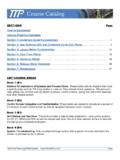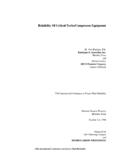Transcription of Technical Courses Hands-On Training GSRMS 2017
1 Technical Courses Hands-On Training GSRMS 2017. Monday - Wednesday, April 24-26 Crowne Plaza, Baton Rouge, LA. TC1 Laby - Reciprocating Compressor maintenance - ( hands On). Instructor: Lou Boothe, Arkos Field Services course date/time: Monday, April 24 - 1-5 pm Tuesday, April 25 - 8 am - 5 pm;. Wednesday, April 26 - 8 am - 12 pm course Cost: $725 by March 31, 2017; $775 thereafter. Includes GSRMS All-Inclusive Registration Description: A two day Hands-On mechanical Technical course covering selected maintenance procedures on Laby Compressor units. 1. Compressor maintenance - Disassembly of compressor cylinders - Inspection and qualification of components - Documentation of as found conditions - Documentation on forms - Reassembly of compressor cylinders - Documentation of reassembly and as left conditions - Documentation on forms 2. Compressor Inspection and documentation of the crankcase, main and conn-rod bearings and running gear.
2 TC2 - Alignment I - Dial Indicators ( hands - On). Instructor: Mitch LeBlanc, Arkos Field Services course date/time: Monday, April 24 - 1-5 pm Tuesday, April 25 - 8 am - 5 pm Wednesday, April 26 - 8 am - 12 pm course Cost: $725 by March 31, 2017; $775 thereafter. Includes GSRMS All-Inclusive Registration Description: course of instruction in alignment, including precision tools, basic math, couplings, chocks, foundations, rotating equipment installation, coupling alignment, and specific equipment alignment requirements. (Power Point with Hands-On Training using a simulator). _____. Short Courses (4 hr.) and Tutorials (2 hrs.) - The following programs included in price of conference registration Short course 1 - Gas Turbine Performance (Measuring, Maximizing, and Maintaining). Monday, April 24 1 5 Speaker: John Peterson, BASF Corporation This introduction to gas turbine performance provides the attendee with a basic understanding of the cycle theory, its calculation, and the variables that most significantly affect output and efficiency.
3 It also provides the methodology to use actual field data, along with the manufacturer's design data, to assess or predict gas turbine performance in a practical way. Such knowledge is a significant step toward an improved operational outcome with regard to output, efficiency, reliability, availability, and overall cost of ownership. Powerpoint slide presentations are used throughout, and an Excel-based cycle evaluation or prediction calculation is demonstrated. Topics include the value of air and fuel filtration, and fuel conditioning that help maintain expected performance, as well as various techniques (steam, water, or air injection) that enhance performance. In addition, the significance of certain mechanical conditions (clearances, wear, etc) in the compressor and the turbine's hot gas path are explored. These are important in managing the inevitable deterioration in gas turbine output over time due to wear and degradation, and decision-making with regard to performance restoration through targeted component replacement.
4 Finally, practical techniques to establish a continuous ongoing gas turbine performance assessment program will be suggested, as well as how to leverage just a few key measurements into a comprehensive check-up of your gas turbine operation. Case studies of significant performance restorations are also included. Short course 2 - Gas Turbine RCFA: Blade Failures Monday, April 24 1 5 Speakers: John Macha & Hector Delgado, SWRI. Gas turbines blade failures can have a major economic impact due to downtime and corrective maintenance costs. Failure analysis is required to reduce the cost of operation by preventing future failures. The goal of root cause failure analysis (RCFA) is to identify the cause and to avoid recurrence. High cycle fatigue plays a major role in a good number of failures and in some cases accounts for more mechanical failures than any other mechanism.
5 This paper presents typical methodologies carried out to conduct failure analysis of gas turbine blade failures due to high cycle fatigue. Specific analyses are referenced to steps in the RCFA process. Tools available for assisting failure analysis are also provided in this Technical course . The Machinery program at SwRI is internationally known for its expertise in gas turbine technology, rotordynamics, and design audits. SwRI has helped develop and operate reliable, safe turbo and reciprocating machinery for more than 50 years. SwRI combines custom consultations, extensive field experience, with world leading analytical, computational, and test capabilities. SwRI has completed contract work for all major oil and gas, power generation, and manufacturing companies. Short course 3 - Predictive maintenance PDM. Monday, April 24 1 5 Speaker: Don Sanger, IVC Technologies PDM Awareness Training is meant to highlight the different Predictive maintenance technologies found in today's industrial environment and to explain their uses for Condition Monitoring purposes.
6 There are also basic discussions on maintenance Best Practices and how they effect the life span of your rotating equipment. This short session is designed for people new to plant maintenance , all the way up to seasoned veterans who might have never been exposed to Predictive maintenance technologies or Condition Monitoring techniques. Predictive maintenance Programs have been proven in industry to be a far better method of managing rotating equipment rather than relying solely on time based Preventative maintenance techniques. This short session is designed to highlight the different PDM. technologies commonly found in today's industrial environment and give you the why & how to apply them at your facility. Short course 4 TBA. Monday, April 24 1-5 Short course 5 - Introduction to Vibration Analysis Tuesday, April 25 8 12 Speaker: Allen Bailey, IVC Technologies This Training session is an introduction course into the world of vibration analysis as it related to industrial applications.
7 The main focus will be to explain the theory behind vibration analysis, the progression of its capabilities over the years due to technology improvements, and to provide examples of real world applications. Many terms, plot types, and concepts will be explained through the course of this session to help attendees be more comfortable with the technology Short course 6 - Basic Thermodynamics of Reciprocating Compression Tuesday, April 25 8 12 Speaker: Greg Phillippi, Ariel Corp. This short course will cover the fundamental thermodynamic principles that govern reciprocating compressors. This will include discussions of pressure-time and pressure-volume diagrams, capacity, volumetric efficiency, power and compression efficiency. In addition, it will cover the effects of changing conditions, gas analysis, temperature, and pulsation. Mechanical design details will not be covered in any significant detail.
8 An understanding of the basic thermodynamics is vital and forms a good foundation for a deeper understanding of the mechanical aspects. This short course is intended to provide the very basic fundamentals of how a reciprocating compressor works. This knowledge then provides a solid foundation on which to learn more intricate details. Short course 8 -The New OSHA: Adapting to Changes in OSHA Enforcement Wednesday, April 26 8 12 Speaker: Ken Wells, Lifeline Strategies Prosecutors are increasingly hitting managers and executives with criminal charges for company OSHA. violations. New OSHA reporting rules mean that the chances of an incident putting a company under OSHA's spotlight have increased. This discussion-focused presentation will explore new OSHA trends, what they mean to participants and why companies that don't focus on compliance before an incident may find it hard to escape the agency's scrutiny.
9 Short course 9 - Ultrasound 101 - An Introduction to Airborne & Structure-borne Ultrasound Wednesday, April 26 8 12 Speaker: Adrian Messer, UE Systems, Inc. Ultrasound has become a must have technology for any plant and facility's maintenance & reliability program. This short course will provide a thorough overview of ultrasound technology and how it continues to enhance condition monitoring, equipment reliability, and energy conservation efforts. From compressed air, gas, and steam leaks to mechanical and electrical systems, ultrasound technology has been used to reduce energy waste, reduce greenhouse gas emissions, eliminate equipment failure, increase production while decreasing downtime. Ultrasound technology, instrumentation, and software will be discussed, along with best practice information on creating routes, establishing baselines and alarm levels, and reporting and documentation.
10 Sound file examples of electrical anomalies such as corona, tracking, and arcing will be used. Along with sound examples of bearings and bearings in the process of being lubricated. Learn the many benefits of using ultrasound technology to improve reliability efforts. From compressed air/gas leak detection, steam traps, bearings, condition based lubrication, and electrical inspection, ultrasound is the most versatile PdM tool available. _____. Tutorial 1 - How Lubricant Cleanliness Affects Machine Life and Reliability Speaker: Gregory Gaubert, Gaubert Oil Tuesday, April 25 8-10 Particle contamination in lubricants is the No. 1 cause of lubricant-related equipment failure, according to industry experts at Noria Corporation. Machinery Lubrication magazine says particle contamination is the No. 1 cause of hydraulic system failures and estimates 82 percent of component wear is particle- induced, with abrasion wear accounting for two-thirds of that figure.


